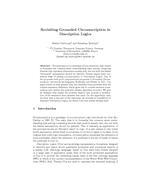Revisiting Grounded Circumscription in Description Logics
From International Center for Computational Logic
Revisiting Grounded Circumscription in Description Logics
Stathis DelivoriasStathis Delivorias, Sebastian RudolphSebastian Rudolph
Stathis Delivorias, Sebastian Rudolph
Revisiting Grounded Circumscription in Description Logics
In Magdalena Ortiz, Stefan Schlobach, eds., Proceedings of the 10th International Conference on Web Reasoning and Rule Systems, volume 9898 of LNCS, 46-60, September 2016. Springer
Revisiting Grounded Circumscription in Description Logics
In Magdalena Ortiz, Stefan Schlobach, eds., Proceedings of the 10th International Conference on Web Reasoning and Rule Systems, volume 9898 of LNCS, 46-60, September 2016. Springer
- KurzfassungAbstract
Circumscription is a paradigm of non-monotonic logic meant to formalize the common-sense understanding that, among competing theories that represent phenomena equally well, the one with the fewest "abnormal" assumptions should be selected. Several papers have considered ways of adding circumscription to Description Logics. One of the proposals with good computational properties is Grounded Circumscription, introduced by Sengupta, Krishnadi and Hitzler in 2011. Our paper builds on their general idea, but identifies some problems with the original semantics definition, which gives rise to counter-intuitive consequences and renders the proposed tableau algorithm incorrect. We give an example that makes the problem explicit and propose a modification of the semantics that remedies this issue. On the algorithmic side, we show that a big part of the reasoning can actually be transferred to standard Description Logics, for which tools and results already exist. - Forschungsgruppe:Research Group: Computational LogicComputational Logic
@inproceedings{DR2016,
author = {Stathis Delivorias and Sebastian Rudolph},
title = {Revisiting Grounded Circumscription in Description Logics},
editor = {Magdalena Ortiz and Stefan Schlobach},
booktitle = {Proceedings of the 10th International Conference on Web Reasoning
and Rule Systems},
series = {LNCS},
volume = {9898},
publisher = {Springer},
year = {2016},
month = {September},
pages = {46-60}
}
